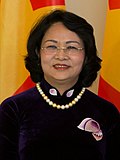| No. | Portrait | Name
(Birth–Death) | Term of office | Political party |
|---|
| Took office | Left office | Time in office |
|---|
| President of the Socialist Republic of Vietnam |
|---|
| (2) |  | Tôn Đức Thắng
(1888–1980) | 2 July 1976 | 30 March 1980 | 3 years, 272 days | Communist Party of Vietnam |
|---|
| — |  | Nguyễn Hữu Thọ
(1910–1996) | 30 March 1980 | 4 July 1981 | 1 year, 96 days | Communist Party of Vietnam |
|---|
| Chairman of the Council of State of the Socialist Republic of Vietnam |
|---|
| 3 |  | Trường Chinh
(1907–1988) | 4 July 1981 | 18 June 1987 | 5 years, 349 days | Communist Party of Vietnam |
|---|
| 4 |  | Võ Chí Công
(1912–2011) | 18 June 1987 | 22 September 1992 | 5 years, 96 days | Communist Party of Vietnam |
|---|
| President of the Socialist Republic of Vietnam |
|---|
| 5 |  | Lê Đức Anh
(1920–2019) | 22 September 1992 | 24 September 1997 | 5 years, 2 days | Communist Party of Vietnam |
|---|
| 6 |  | Trần Đức Lương
(1937–2025) | 24 September 1997 | 27 June 2006 | 8 years, 276 days | Communist Party of Vietnam |
|---|
| 7 |  | Nguyễn Minh Triết
(born 1942) | 27 June 2006 | 25 July 2011 | 5 years, 28 days | Communist Party of Vietnam |
|---|
| 8 |  | Trương Tấn Sang
(born 1949) | 25 July 2011 | 2 April 2016 | 4 years, 252 days | Communist Party of Vietnam |
|---|
| 9 |  | Trần Đại Quang
(1956–2018) | 2 April 2016 | 21 September 2018 | 2 years, 172 days | Communist Party of Vietnam |
|---|
| — |  | Đặng Thị Ngọc Thịnh
(born 1959) | 21 September 2018 | 23 October 2018 | 32 days | Communist Party of Vietnam |
|---|
| 10 |  | Nguyễn Phú Trọng
(1944–2024) | 23 October 2018 | 5 April 2021 | 2 years, 164 days | Communist Party of Vietnam |
|---|
| 11 |  | Nguyễn Xuân Phúc
(born 1954) | 5 April 2021 | 18 January 2023 | 1 year, 288 days | Communist Party of Vietnam |
|---|
| — |  | Võ Thị Ánh Xuân
(born 1970) | 18 January 2023 | 2 March 2023 | 43 days | Communist Party of Vietnam |
|---|
| 12 |  | Võ Văn Thưởng
(born 1970) | 2 March 2023 | 21 March 2024 | 1 year, 19 days | Communist Party of Vietnam |
|---|
| — |  | Võ Thị Ánh Xuân
(born 1970) | 21 March 2024 | 22 May 2024 | 62 days | Communist Party of Vietnam |
|---|
| 13 |  | Tô Lâm
(born 1957) | 22 May 2024 | 21 October 2024 | 152 days | Communist Party of Vietnam |
|---|
| 14 |  | Lương Cường
(born 1957) | 21 October 2024 | Incumbent | 1 year, 53 days | Communist Party of Vietnam |
|---|






























